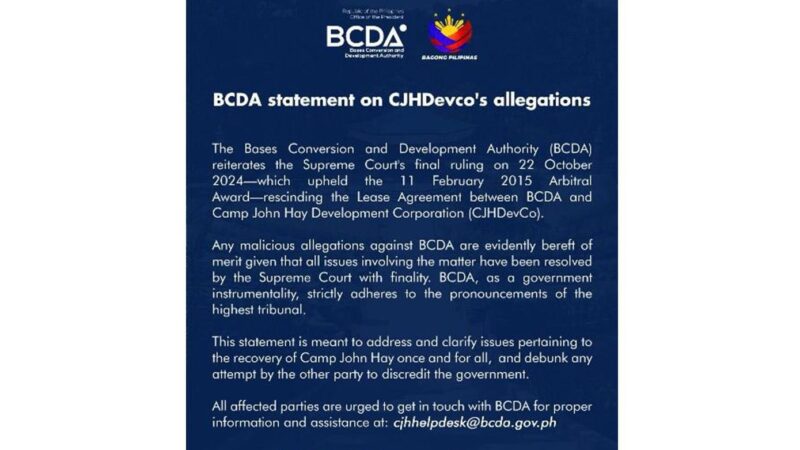CDA Officials says BENECO is CDA-Registered

Dickson Aycud, a key official of the Cooperative Development Authority-Cordillera Administrative Region (CDA-CAR), told the Baguio City Council during the regular session last Monday that the Benguet Electric Cooperative, Inc. (BENECO) was registered with the CDA on November 11, 2020.
Aycud said the capital share of the member-consumer-owners (MCOs) shall form part of the common capital of the electric cooperative.
The subscription of shares is mandatory for all CDA-registered electric cooperatives as provided in Republic Act No. 9520 or the Philippine Cooperative Code of 2008.
Having converted from a non-stock and non-profit to a stock cooperative, BENECO is required to offer shares of stock to its members. The members must then pay their capital share with a minimum value of P500.00. The collected payments will be rolled out as capital for BENECO’s operations.
As a stock cooperative, BENECO will distribute dividends to its MCOs once it earns profits from these operations.
Certificates were issued to those who paid their share capital contribution.
Attending the city council’s regular session via Zoom, Engr. Melchor Licoben said the collected capital share payments are deposited in certain banks. However, he refused to disclose information about these banks because of the ongoing leadership impasse in BENECO.
“This is to protect BENECO’s relationship with these banks. There have been so many attempts by the other camp to stop the banks that continue to honor the transactions with BENECO,” Licoben said.
It can be remembered that Licoben suspended the collection of BENECO payments in some commercial and rural banks.
In his advisories to the BENECO MCOs, Licoben explained that Development Bank of the Philippines (DBP), Philippine National Bank (PNB), and Land Bank of the Philippines changed the signatories and no longer recognize Licoben and BENECO Board President Esteban Somngi as authorized signatories.
Meanwhile, Rang-ay Bank, Bank of the Philippine Islands (BPI), and Metrobank decided to freeze BENECO’s accounts.
Licoben told the city council that the MCOs are encouraged to pay their electric bills and capital share at Southdrive Headquarters; Maharlika Livelihood Complex; Bonuan Condominium; KM4 Balili, La Trinidad; Bekes, Buyacaoan, Buguias; and Abatan Subarea Offices.
The city council decided to invite representatives of DBP, PNB, and Land Bank to one of its regular sessions to inquire whether they are still accepting BENECO payments.
The discussion stemmed from the claim of Councilor Fred Bagbagen that MCOs are “questioning” the collection of capital share contributions.
Bagbagen also questioned Licoben’s authority to print official receipts. He mentioned that Douglas Rufino, Bureau of Internal Revenue-CAR Regional Director, granted Atty. Marie Rafael authority to print receipts.
Licoben assured the city council members that the receipts issued by BENECO’s collection centers are duly approved and authorized by the Bureau of Internal Revenue (BIR).
“Once you run out of receipts previously authorized by BIR, how will you be able to generate receipts? This would prejudice our consumers,” Bagbagen stated.
The city council will likewise invite representatives of BIR-CAR to attend the next forum to cast light on this matter.
During the session, the city council dodged any discussions pertaining to the legitimacy of the conduct of a special general membership assembly by BENECO under the leadership of Licoben so as not to violate the sub judice rule.
Previously, the Regional Trial Court (RTC) issued a 72-hour temporary restraining order (TRO) against the conduct of the electric cooperative’s special general membership assembly which was originally scheduled on February 12, 2022.
The TRO was filed by Luke Gomeyac, Rocky Aliping, Enrique Moresto, and James Aclopen versus Licoben, Somngi, the seven BENECO board of directors, BENECO Employees Labor Union (BELU) President Jefferd Monang, and BENECO Lawyer Delmar Cariño.
Gomeyac, Aliping, Moresto, and Aclopen were dismissed by the BENECO MCOs during the annual general membership assembly on October 2, 2021 for allegedly acting against the employees and other officials of the electric cooperative and for siding with Rafael.
𝙉𝙀𝘼’𝙨 𝙘𝙡𝙖𝙨𝙝 𝙬𝙞𝙩𝙝 𝘽𝙀𝙉𝙀𝘾𝙊 𝙖𝙣𝙙 𝙡𝙤𝙘𝙖𝙡 𝙤𝙛𝙛𝙞𝙘𝙞𝙖𝙡𝙨
Licoben was appointed by the BENECO BODs as the general manager while Rafael, a former Presidential Communications Operations Office (PCOO) official, was appointed by the National Electrification Administration Board of Administrators (NEA-BOA) to the said position.
The endorsement of Rafael as general manager by the NEA-BOA caused an uproar among Baguio and Benguet residents.
In May 2021, the city council called on the NEA-BOA to adhere to its own policy for the selection of general managers of electric cooperatives as contained in NEA Memorandum No. 2017-35 after it endorsed Rafael as the lone candidate for the position of BENECO general manager.
Issued in 2017, the NEA memorandum spelled out the recruitment policy for general managers of electric cooperatives in the country.
Amid the controversy, the House Committee on Energy ordered the NEA-BOA to respect the status quo in the position of BENECO general manager. Mayor Benjamin Magalong and some Benguet officials likewise called on the NEA-BOA to observe the status quo.
The dispute thickened when the NEA-BOA suspended the seven BENECO BODs including Somngi and Licoben for 90 days after defying the appointment of Rafael as the electric cooperative’s general manager.
Atty. Omar Mayo was appointed by the NEA as BENECO’s project supervisor to resolve the dispute between Rafael and Licoben and to “fix organizational management issues and concerns.”
The city council declared Mayo as persona non grata for “forcibly” taking over BENECO in the wee hours of October 18, 2021 with the help of some Philippine National Police (PNP) personnel.
The Benguet Provincial Board likewise marked Mayo and Rafael as personae non-gratae.
A case filed by Licoben questioning the process of the appointment of general manager done by NEA-BOA is pending before the Court of Appeals. –Jordan G. Habbiling







